Coordinación
Una coordinación sólida puede evitar vacíos y duplicaciones en las respuestas humanitarias, así como garantizar que los PTM complementen otros tipos de asistencia. Sin embargo, el informe del «Estado Global de los Programas de Transferencias Monetarias» de la CALP Network muestra que la coordinación de la asistencia en efectivo es vista como débil y ad hoc, y que esto está teniendo graves repercusiones operativas.
Los donantes, las ONG y los líderes de los grupos de trabajo de transferencias monetarias (GTM) han pedido claridad sobre tres temas principales relacionados con la coordinación de la asistencia en efectivo:
- Quién debe ser responsable de asegurar una coordinación eficaz de la asistencia en efectivo;
- Cuál es la función y el mandato de los grupos de trabajo de transferencias monetarias, incluso en relación con las transferencias monetarias multipropósito;
- Cómo se debe dotar de recursos a la coordinación de asistencia en efectivo.
Tenemos que basarnos urgentemente en lo que funciona y proporcionar claridad a nivel mundial sobre las preguntas arriba mencionadas, adaptándonos a los diferentes contextos. Hace mucho tiempo que se deberían haber tomado decisiones claras basadas en necesidades operativas y no en la política de las agencias.
Prioridades actuales
El objetivo de la CALP Network es contribuir a seguir progresando en este tema en tres niveles: apoyar a los grupos de trabajo de transferencias monetarias a nivel regional; contribuir a soluciones prácticas para la coordinación de la asistencia en efectivo a nivel mundial; y convocar una discusión basada en la evidencia sobre temas clave, destacando puntos de decisión críticos y oportunidades de progreso.
Contenido destacado

Cash Coordination Tip Sheet
Guidelines and Tools
This tip sheet sets out established best practice, key guidance and resources for all aspects of cash coordination, intended as a clear, accessible and action-oriented guide for those engaged in coordination of cash and voucher assistance (CVA) at the field level.

Introducing the Cash Coordination Tip Sheet
Webinar
The CALP Network has developed a tipsheet setting out established best practice and key guidance and resources for all aspects of cash coordination, intended as a clear, accessible and action-oriented guide for those engaged in coordination of cash and voucher assistance at the field level.

Cash Coordination: A proposal from members in MENA
Blog Post
Earlier this year the CALP Network undertook regional consultations to explore options for cash coordination. This blog lays out recommendations from participants from the Middle East and North Africa who sketched out what cash coordination, and coordination more broadly, could look like in future to support a more effective, efficient and accountable response.
Últimos recursos

Korogocho Cash Transfer Initiative: Supporting ‘Transformative Social Protection’ in the Kenyan Urban Slums
Case Study
This case study looks at Concern Worldwide’s work with the Kenyan government to introduce the concept of transformative social protection (which acknowledges that vulnerability is not only related to income, and seeks to complement cash transfers with components addressing further vulnerabilities) to...
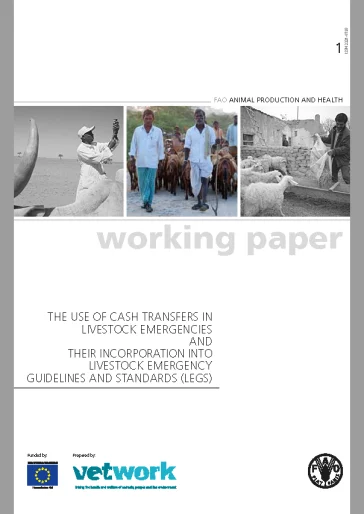
The Use of Cash Transfers in Livestock Emergencies and their Incorporation into Livestock Emergency Guidelines and Standards (LEGS)
Guidelines and Tools
This paper reviews the use of cash transfers within the livestock sector and suggests how they can be incorporated into and support Livestock Emergency Guidelines and Standards (LEGS). The paper’s structure reflects the stages of the LEGS Handbook as these in turn reflect good project cycle management....

Philippines: Cash vouchers via debit cards
Report
This one-page poster provides an overview of ACF’s programme to provide cash vouchers via debit cards in Cotabato City and Sultan Kudarat, Autonomous Regions of Muslim Mindanao, Republic of the Philippines
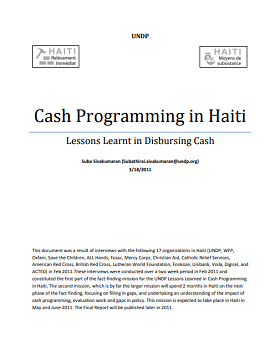
Cash Programming in Haiti – Lessons Learned in Disbursing Cash
Report
The following report is the result of an initial 2 week mission to Haiti to investigate cash programming (including cash for work) amongst 17 organizations. It is not intended as an exhaustive review of 17 organizations’ practices, but attempts to look at what were some of the critical stages in cash...
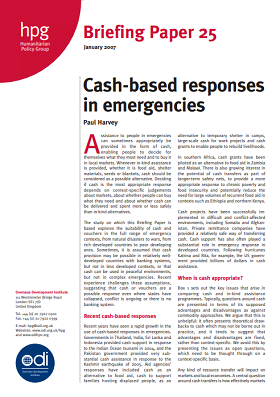
Cash-based Responses in Emergencies
Report
This short HPG briefing paper looks at the suitability of cash based responses in a range of emergency situations. It gives a rapid overview of recent cash based responses and examines the key issues around comparing cash and in-kind programmes. It briefly looks at the impact of cash, the issues of...
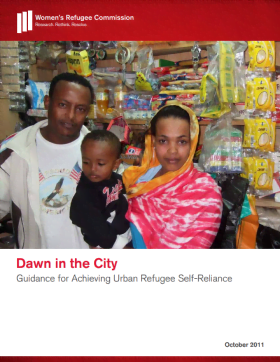
Dawn in the City: Guidance for achieving urban refugee self-reliance
Report
More than 50 percent of refugees live in urban areas. Eighty percent are hosted by developing nations, in cities ill-equipped to guarantee their protection. The majority are marginalized due to their legal, economic and social status. They frequently lack sufficient legal and social...

Seeking Acceptance: The Promise of Cash in High-Risk Areas
Report
Somalia is one of the world’s most insecure states with a protracted conflict that continues to profoundly affect its civilians. Thirty-two percent of the Somali population – or 2.4 million of its 7.5 million people – is currently in need of humanitarian assistance (FSNAU, 2011a). The needs are...
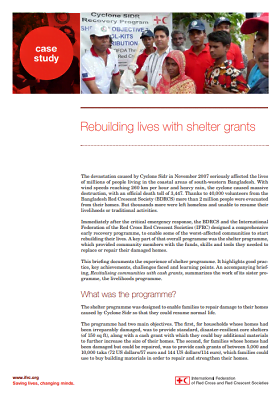
Rebuilding lives with shelter grants
Case Study
Bangladesh following the devastation caused by Hurricane Sidr in 2007. Part of the overall programme was the shelter programme, which provided community members with the funds, skills and tools they needed to replace or repair their damaged homes. Dependent on the damage to the homes, households were...
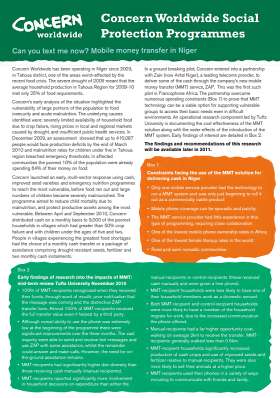
Can you text me now? Mobile money transfer in Niger
Case Study
This case study looks at Concern Worldwide’s ground breaking project using a new mobile money transfer system in Niger, following the severe drought of 2009, to demonstrate the effectiveness of this technology in supporting vulnerable groups to access their basic needs. This very brief document looks at...
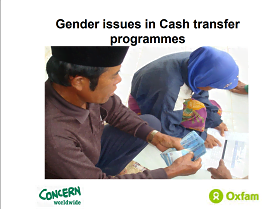
Gender issues in Cash transfer programmes
Presentation
Purpose of the study: To assess the changes in gender power relations within households and in the community, as a result of emergency cash transfer programmes. To review the processes followed by agencies in emergency cash transfer programming and analyse their adequacy from a gender perspective

Cash Learning Bulletin August 2011
Report
This newsletter includes articles and updates on: Smart cards used for the first time in Zimbabwe cash transfers Philippines cash learning group starts up Technical forum on cash transfers in Kenya & Somalia CALP Ivory Coast cash guidelines and details of forthcoming research for the period.
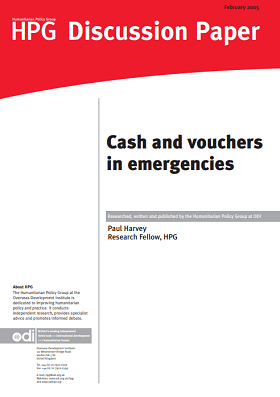
Cash and Vouchers in Emergencies
Report
This HPG discussion paper examines all aspects of using cash and vouchers to assist people in emergency situations. It provides a background to the literature and theory around cash and vouchers, looks at the current picture through selected examples and examines the decision making process on the...
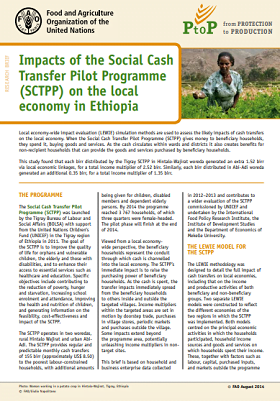
Impacts of the Social Cash Transfer Pilot Programme (sctpp) on the local economy in Ethiopia
Report
The Social Cash Transfer Pilot Programme (SCTPP) was launched by the Tigray Bureau of Labour and Social Affairs (BOLSA) with support from the United Nations Children’s Fund (UNICEF) in the Tigray region of Ethiopia in 2011. The goal of the SCTPP is to improve the quality of life for orphans and...
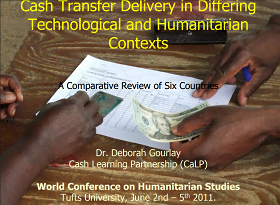
Cash Transfer Delivery in Differing Technological and Humanitarian Contexts
Report
A Comparative Review of Six Countries
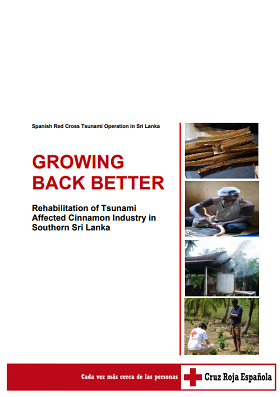
Growing back better: Rehabilitation of tsunami affected cinnamon industry in Southern Sri Lanka
Case Study
This case study looks at the Spanish Red Cross’ intervention in post-tsunami Sri Lanka which aimed at supporting smallholder cinnamon growers, whose fields had been destroyed by the tsunami, to recover and improve their cinnamon production as a way to restore their means of living. Cash grants were...

Cheques: A quick delivery guide for cash transfer programming in emergencies
Guidelines and Tools
A Quick Delivery Guide to delivering money through cheques. Prepared as a practical tool, this guide provides a brief synthesis of the necessary preconditions and advantages and disadvantages of using cheques. It also provides practical implementation tips.

Public Health Agencies and Cash Transfer Programmes: Making the case for greater involvement
Policy paper
This report examines the case for greater involvement by public health agencies in cash transfer schemes, a form of welfare assistance. It seeks to identify opportunities, obstacles and actions that might support greater involvement. The issue arises because cash transfer schemes are an increasingly...

IASC Evaluation of the Humanitarian Response in South Central Somalia 2005-2010
Case Study
This independent report presented by DARA confirms that humanitarian aid in Somalia has saved thousands of lives between the years 2005 to 2010. The report is based on an evaluation of the humanitarian response in south-central Somalia and is one of the most comprehensive evaluations of aid in Somalia...
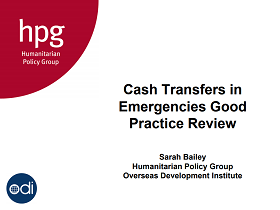
Cash Transfers in Emergencies Good Practice Review: Presentation
Presentation
Powerpoint presentation on the then-forthcoming Good Practice Review on cash transfer programming in emergencies.
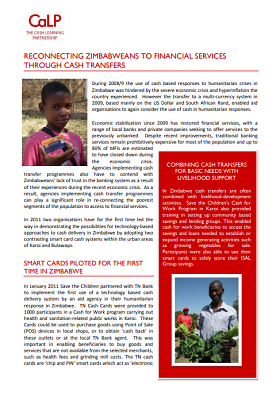
The CALP Network Newsletter supplement Zimbabwe cards Aug 11
Report
Supplement to the CALP Network August 2011 newsletter, focusing on the topic of ‘Reconnecting Zimbabweans to financial services through cash transfers’. Includes sections on: Piloting of smart cards in Zimbabwe Combining cash transfers for basic needs with livelihood support